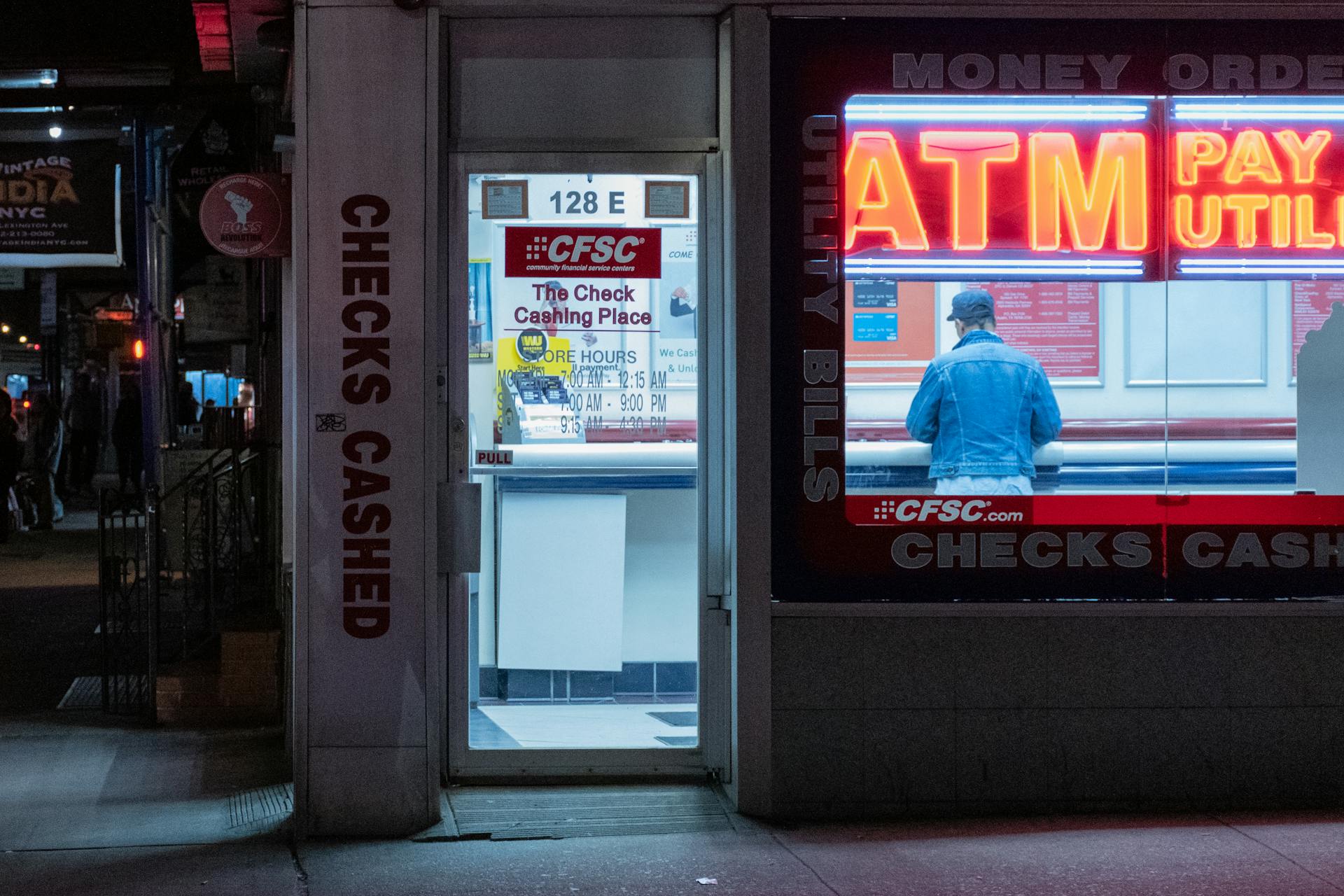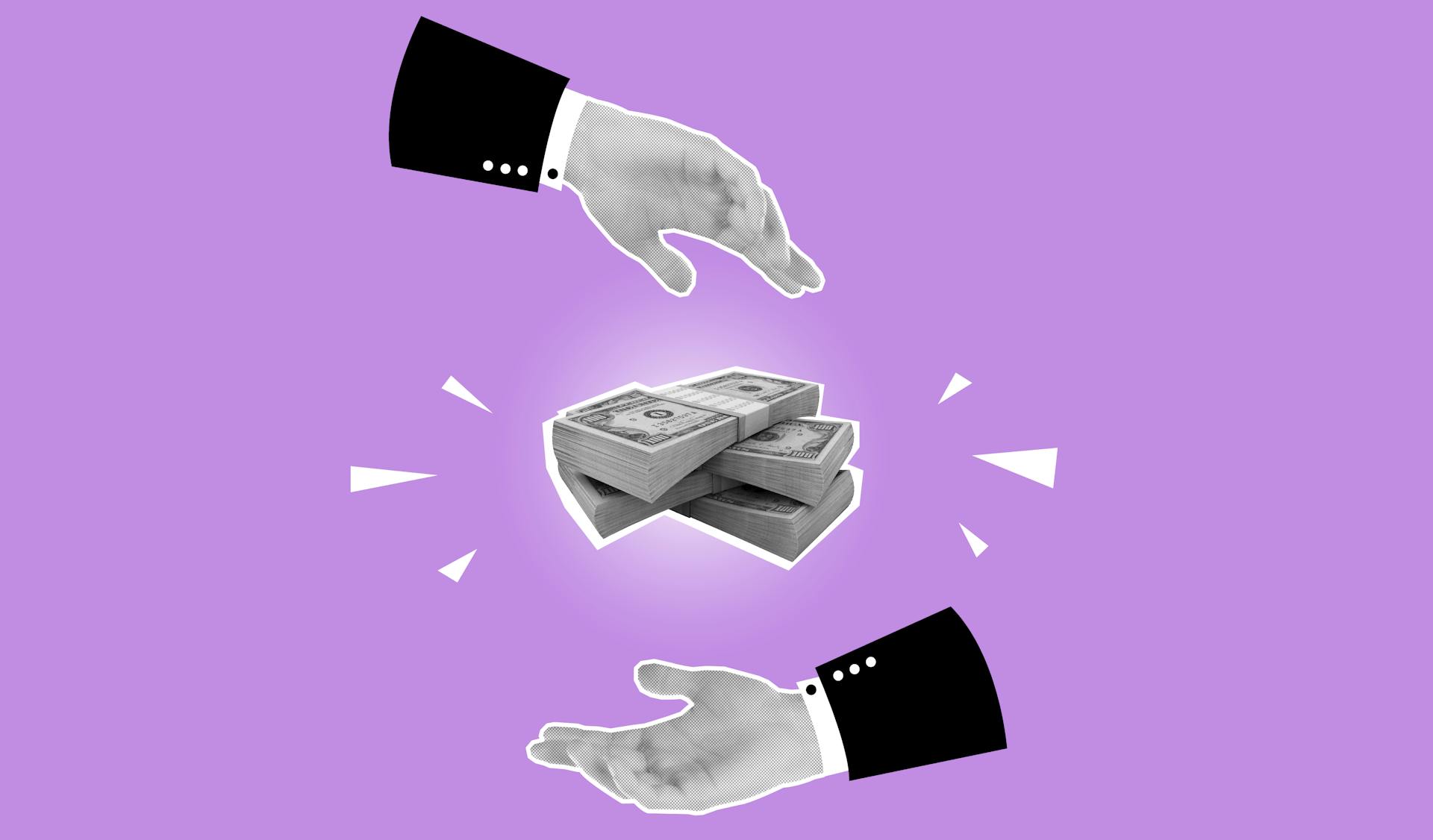
Payday lenders are financial institutions that provide short-term loans to individuals with the promise of quick cash, often at high interest rates.
These lenders typically operate in a gray area of the law, with some states allowing them to operate freely while others have implemented strict regulations.
In the United States, payday lending is regulated by the federal government, but the specifics of the laws vary from state to state.
Payday lenders often target low-income individuals who may not have access to traditional banking services or credit.
Take a look at this: Payday Loan United States
What is Payday Lending?
Payday lending is a type of high-cost, short-term loan that's meant to be repaid with the borrower's next paycheck.
A payday loan is typically for a small amount, usually $500 or less, and is available online or at a physical branch of a payday lender.
These loans charge high fees, equivalent to triple-digit annual percentage rates (APRs), and payments are typically due within two weeks or close to your next payday.
Payday lenders require only proof of identification, income, and a bank account to approve the loan.
You can receive cash, a check, or have the money deposited into your bank account if you're approved for a payday loan.
Payday loans are unsecured, meaning you don't have to pledge your car or other property to qualify.
In exchange for the loan, the lender will ask for a signed, post-dated personal check or permission to electronically withdraw money from your bank account on the due date.
The loan is due on your next payday, typically in two weeks, but sometimes in one month.
If you can't afford to repay a payday loan, you can renew it or roll it over into a new payday loan, which compounds your finance charges and could create a cycle of debt.
Payday lenders typically charge a fixed fee that's due with the loan repayment.
Cost and Fees
Payday loans typically cost $10 to $30 for every $100 borrowed, according to the Consumer Financial Protection Bureau.
These fees can add up quickly, making it easy to get trapped in a cycle of debt. Payday loans usually have short repayment terms, which can lead to extremely high APRs, often 400% or more.
A two-week payday loan typically costs $15 per $100 borrowed, which equates to an APR of almost 400% due to the short loan length.
In comparison, APRs on credit cards typically range from 12% to 30%, and personal loans max out at 36%.
The APR on a $100 payday loan with a $15 fee due in two weeks is 391%, making it a very expensive option.
Payday lenders often prefer to explain costs in terms of fees rather than interest, but they must disclose the APR before the borrower signs a loan agreement.
The APR is the best apples-to-apples cost comparison tool for loans and credit cards, and it shows why payday loans are often the most expensive option.
A unique perspective: Payday Loan Chart Fees
Legality and Regulation
Payday loans are heavily regulated, and their legality varies from state to state. In fact, 18 states and the District of Columbia have banned or heavily regulated payday loans, making it difficult for lenders to operate in these areas.
New York has strict laws to protect consumers from exorbitant interest rates, capping interest rates at 16% for unlicensed payday lenders and 25% for licensed ones. Most payday loans, however, far exceed these rates.
Payday lenders must comply with state-specific regulations, including limits on APRs based on the loan's size and repayment term. This means that lenders must be aware of the laws in the state where they operate and adjust their rates accordingly.
Intriguing read: Ct Cash Advance Laws
Are Legal?
Payday loans are regulated by each state, which means the rules can vary significantly from one place to another.
The District of Columbia and 18 states have banned or heavily regulated payday loans to the point where lenders don't operate there. These states include Arizona, Arkansas, Connecticut, and 14 others.
Payday lenders must adhere to state regulations, which often involve setting limits on the APR they can charge based on the loan's size and repayment term.
The Pew Charitable Trusts analyzed payday loan regulations in 2022 and found that these 18 states have effectively banned payday loans.
Additional reading: Payday Loan Laws by State
New York Caps Interest Rates
New York caps interest rates on payday loans, protecting consumers from exorbitant rates.
The state's laws limit interest rates to 16% for unlicensed payday lenders, and up to 25% for licensed ones.
This means that most payday loans, which often charge much higher rates, are not allowed in New York.
Payday lenders that are not licensed by New York State cannot charge individuals in New York interest over 16% for personal loans of $25,000 or less.
Note that federal laws exempt most banks and credit cards from New York's usury rates.
For your interest: New Payday Lenders
Do Lenders Check Credit?
Do lenders check credit? Typically, you don't need to undergo a credit check when applying for a payday loan, making it appear to be less risky than alternative financing options.
However, payday loans are among the riskier financial choices you can make, especially when you're already experiencing financial hardship.
You might like: One Main Financial Payday Loan
Does It Affect Credit?
Generally, payday loans do not affect credit, since there's no hard inquiry when you apply.
Payday lenders typically don't report on-time payments to the credit reporting agencies, so making timely payments shouldn't hurt your credit.
However, if you can't repay a payday loan and the lender sells your debt to a collection agency, it can cause significant damage to your credit scores.
Getting a Loan
Before applying for a payday loan, compare alternatives to ensure it's the best option for your financial situation. This might mean asking your landlord for an extension, getting on a payment plan for utility bills, or reaching out to creditors to ask for a payment deferral.
To qualify for a payday loan, you typically need an active bank account, a government-issued ID, and proof of income such as a pay stub. You must be at least 18 years old, and some lenders also require a Social Security number.
Have a plan to repay the loan in full on or before the due date to avoid additional fees and debt traps. Knowing how you'll repay the loan will also prevent you from having to borrow again.
Payday lenders have few requirements for approval, and most don't run a credit check. Typically, all you need is a photo ID, a bank account in relatively good standing, and a steady paycheck.
Additional reading: Payday Loan Repayment Plan
If payday lenders operate in your state, you can apply for a payday loan by searching for lenders that offer loans in your area. Options may include online lenders and physical stores that might also offer check cashing, money transfer, and other services.
Here are the typical requirements for a payday loan:
- A photo ID
- A bank account in relatively good standing
- A steady paycheck
Alternatives and Consequences
Alternatives to payday loans can be found through mobile apps, credit unions, and banks. Mobile apps like Earnin, Dave, and Brigit offer low-fee advances on your paycheck.
Consider getting a personal loan from a credit union or online lender, which will likely carry a lower APR than a payday loan. Credit unions tend to offer the lowest rates for bad-credit applicants.
Borrowing money from a family member or friend can be a viable option, saving you money on interest and no need for a credit check. You can also reach out to a community organization that provides free funds to cover essential expenses.
Alternatives to Consider

If you're facing a cash emergency, consider using an interest-free cash advance app like Earnin, Dave, or Brigit, but be aware of eligibility requirements and borrowing limits.
You can also get a personal loan from a credit union or online lender, which will likely have a lower APR than a payday loan. Credit unions tend to offer the lowest rates for bad-credit applicants.
Traditional banks are starting to offer small-dollar loans, such as U.S. Bank's Simple Loan, Bank of America's Balance Assist Loan, and Wells Fargo's Flex Loan, which can provide short-term funds for existing customers in good standing.
Borrowing from a family member or friend can save you money on interest and avoid a credit check, but make sure you agree on the terms of the loan.
Community organizations often provide free funds to cover essential expenses, and you can check NerdWallet's database of financial assistance programs to see what's available in your state.
Related reading: What Is Non Sufficient Funds

Consider using a "buy now, pay later" app like Affirm, Afterpay, or Klarna to cover a necessary purchase, which can split up your payment into equal installments with zero interest and no fees if you pay on time.
If you're struggling to pay bills, contact your creditors to work out a payment plan, which may include extensions on bills with additional fees or costs.
You can also talk to your employer about a paycheck advance, but policies vary by employer and repayment is usually deducted from future checks.
A loan from a credit union or a cash advance on a credit card can have lower rates than a payday loan, so shop around for the best offer.
A different take: Missed Payday Loan Payment
Bad Credit Personal
Bad Credit Personal Loans can be a viable option for those with poor credit. Some personal lenders specialize in working with people with poor credit.
You can usually get the cash you need to cover some basic expenses, pay for an emergency, or consolidate debt. Some credit unions even offer payday alternative loans (PALs) that offer more reasonable interest rates and repayment terms.
A bad-credit personal loan will charge a higher interest rate than other personal loans, but the rate will still be much lower than what you'll get with a payday loan.
Readers also liked: How Is the Interest Rate on a Payday Loan Calculated
The Debt Cycle
The debt cycle can be a vicious trap, and it's essential to understand how it works. Twelve million Americans use payday loans per year, often getting caught in an endless debt cycle.
Many lenders "roll over" or renew the loans for an additional fee, leaving borrowers paying many times the face value of the loan in interest. The average borrower uses eight loans and is indebted five months of the year.
Rolling over loans can lead to a staggering 900% annual interest rate, making it nearly impossible to pay off the principal amount. This is why it's crucial to avoid payday lenders and their debt cycle.
Payday loans are often promoted as quick and easy solutions, but the reality is that they come with a hefty price tag. Borrowers must simply prove they have a bank account and a regular source of income, but the fees and interest add up fast.
Curious to learn more? Check out: Debt Consolidation Laws
Frequently Asked Questions
What is a payday loan quizlet?
A payday loan is a short-term loan based on expected wages, providing a cash advance until the next paycheque. It's available online and in-person, offering quick access to funds.
Sources
- https://www.mecep.org/blog/predatory-lending-an-explainer/
- https://www.nerdwallet.com/article/loans/personal-loans/what-is-a-payday-loan
- https://www.experian.com/blogs/ask-experian/how-payday-loans-work/
- https://ag.ny.gov/publications/payday-loans
- https://www.consumerfinance.gov/ask-cfpb/what-is-a-payday-loan-en-1567/
Featured Images: pexels.com


